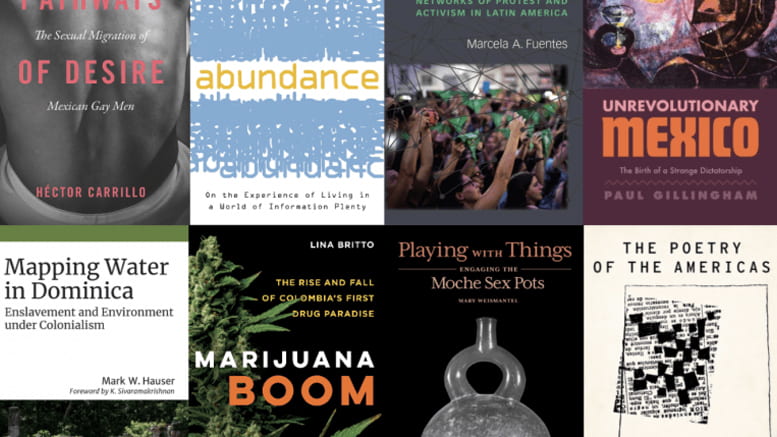Bookshelf: Latest works by faculty in the Latin American and Caribbean Studies Program
September 8, 2021

Explore the latest books published by faculty members in Northwestern’s Latin American and Caribbean Studies Program.
Here are their latest works to add to your reading list:
Playing with Things: Engaging the Moche Sex Pots

Playing with Things
Professor Mary Weismantel, of the Department of Anthropology, published her latest work, “Playing with Things: Engaging the Moche Sex Pots, in August of 2021. The book challenges traditional approaches to gender and sexuality studies by physically interacting with artifacts. Specifically, Weismantel explores how Moche ceramics reveal ancient Indigenous ways of thinking about and experiencing sex.
Weisman is a cultural anthropologist who teaches about race, racism, Latin America, and ethnographic methods and writings at Northwestern. Her writing focuses on new materialisms, decoloniality, and temporality, as well as [trans]gender, sexualities, and ontologies of the nonhuman.
The Logic of Social Science

The Logic of Social Science
In “The Logic of Social Science,” Professor James Mahoney, of the Department of Sociology, offers new ways to design and conduct social science research. Mahoney discusses models of causality, procedures for testing propositions, tools for conducting counterfactual and sequence analysis, and principles for knowledge accumulation, all while placing equal focus on theory building and explanatory tools. His book was published by the Princeton University Press in August 2021.
Mahoney is the Gordon Fulcher Professor in Decision-Making at Northwestern with interests in political development, Latin America, and methodology.
Mapping Water in Dominica: Enslavement and Environment under Colonialism

Mapping Water in Dominica
Professor Mark Hauser, of the Department of Anthropology, published his new book, “Mapping Water in Dominica: Enslavement and Environment under Colonialism,” in May 2021. The work explores how deeply connected plantation slavery and environmental devastation truly were, as colonial administrator’s attempts to cultivate sugarcane in Dominica caused widespread ecological and social disruption.
Hauser’s research specializes in materiality, slavery, and inequality. He employs ethnohistorical, archaeological, and archaeometric approaches to studying how people adapt and contribute to landscapes of inequality. Hauser’s current fieldwork has focused on two communities in Dominica, Portsmouth and Soufriere, but he also has research interests in 18th century Southern India and 19th century North America.
Unrevolutionary Mexico: The Birth of a Strange Dictatorship

Unrevolutionary Mexico
In “Unrevolutionary Mexico: The Birth of a Strange Dictatorship,” History Professor Paul Gillingham addresses how the Mexican Revolution gave way to a capitalist dictatorship of exceptional resilience, where a single party ruled for seventy-one years. While soldiers seized power across the rest of Latin America, Gillingham explains how civilians formed governments in Mexico and managed to move in and out of office through uninterrupted elections.
Gillingham is Director of Northwestern’s Latin American & Caribbean Studies Program, and he specializes in politics, culture, and violence in modern Mexico. He also co-edits the Violence in Latin American History series at the University of California Press.
Faculty

Joel Mokyr wins Nobel Prize in Economic Sciences
October 13, 2025
Nobel recognizes Mokyr’s theory on sustained economic growth Joel Mokyr, the Robert H. Strotz Professor of Arts and Sciences and professor of economics and history in the Weinberg College of Arts and Sciences at Northwestern University, today (Oct….

Northwestern accelerates quantum research with NVIDIA technology
September 19, 2025
NVIDIA code could help researchers tackle computationally demanding tasks hindering quantum research Northwestern University physicists are using NVIDIA technology to tackle the computationally demanding tasks hindering quantum research. Northwestern theoretical physicist Jens Koch and his research group…

Weinberg College welcomes new faculty members for 2025-2026 academic year
September 18, 2025
Shreeya Behera Assistant Professor of Instruction PhD institution: The Ohio State University Previous title and institution: Data Scientist at Pandora Bio, Inc. Home department: Statistics and Data Science Shreeya Behera is a mathematician and data…

Weinberg College faculty and graduate students recognized for excellence in teaching
July 2, 2025
Each year, the Weinberg College of Arts and Sciences and the Office of the Provost recognizes members of the College’s tenure-line and teaching-track faculty for excellence in teaching. Weinberg College in addition recognizes the contributions…



